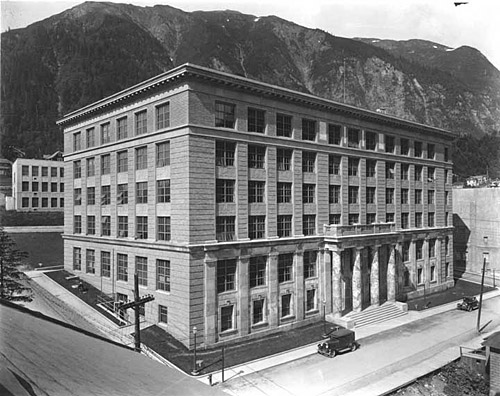100 Years of Alaska's Legislature
"From Territorial Days to Today"
1931
Juneau, Alaska
10th Territorial Legislature
Federal & Territorial Building Completed

Session Information
1st Regular - March 2, 1931 - April 30, 1931
Senate Members
House Members
Territory Infrastructure Developed
The United States was in the throes of the Great Depression when the 10th Territorial Legislature convened in 1931. Although Alaska remained somewhat insulated from the economic destruction, effects were felt in lower fish prices and a drop in mine employment, for example. The Legislature took actions to develop the infrastructure of the Territory, providing for new roads and the installment of radio-telephone systems. Few planes were equipped with radios at this time, so the Legislature provided for the training of carrier pigeons for aviators to use for communications. Recognizing many unmet needs of the developing Territory, the Legislature petitioned the federal government for further assistance in road construction and radio-telephone system installation, airmail service between Seattle and Southeast Alaska communities, and the establishment of Army and Navy stations in the Territory.
The 10th Territorial Legislature was the first to meet in the newly completed Territorial and Federal Building, the future state Capitol. From its new quarters, the Legislature created the Office of the Attorney General and the Board of Budget, promulgated regulations for the selection of jurors, and established laws regulating general elections in the Territory. The Legislature allowed municipalities to collect general taxes for school and municipal purposes, imposed a tax on motor vehicles, and directed the Attorney General to investigate the possibility of an income tax in the Territory. The Legislature also established a commission to plan for the construction of more Pioneer Homes, and the Alaska World's Fair Commission to make preparations for the Territory to be represented at the 1933 World's Fair in Chicago.
Beyond the Legislature
Charles and Anne Marrow Lindbergh land at Point Barrow en route to Japan.
The United States adopts "The Star-Spangled Banner" as the national anthem.
The Empire State Building opens in New York City.
New York's Bank of the United States collapses, the largest individual bank failure in national history at the time.
Congress establishes the Reconstruction Finance Corporation, which distributes more than $9 million in loans and other aid to businesses and state and local governments from 1932 to 1941.
The Union of South Africa achieves independence from the United Kingdom.
Japan invades Manchuria, which it then occupies until the end of World War II.
SPEAKER OF THE HOUSE
Grover Winn
SENATE PRESIDENT
Luther Hess